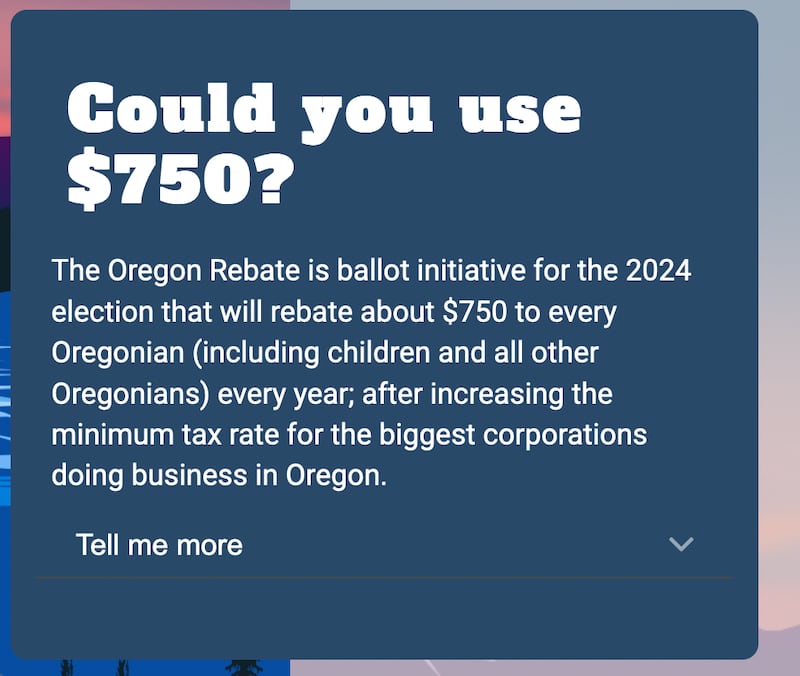Backers of Measure 118, the so-called Oregon Rebate, are sweetening their pitch.
The measure would increase taxes on Oregon companies significantly and then distribute the proceeds to all Oregonians, regardless of need. The Oregon Rebate campaign’s website offers a simple, seductive proposition—money for nothing.

But in recent presentations to groups, such as the Oregon Democratic Central Committee, proponents of the measure have used an updated, even more seductive figure—each Oregonian, including billionaires, such as Nike co-founder Phil Knight and Columbia Sportswear CEO Tim Boyle—would get $1,600, more than double the amount the campaign cited earlier.

The increase is a function of new state analysis of Measure 118′s fiscal impact released late last month. That analysis calculated that raising the corporate minimum tax on companies with more than $25 million in revenues to 3% of sales would create a pool of money in the 2025-27 budget cycle of between $12 billion and $13.6 billion. That money would be distributed to anybody who lives in Oregon for more than 200 days a year, i.e., most of the state’s 4.24 million residents.
Antonio Gisbert, chief petitioner for Measure 118 and a spokesman for the Oregon Rebate campaign, says the $750 per capita figure on the group’s website resulted from earlier calculations made when the campaign first started in 2018. Then, Gisbert says, the hope was to raise $3 billlion a year and distribute that money to 4 million Oregonians. Since then, the revenue figure has grown far faster than the population increase.
“We feel the more accurate frame is that when the program is fully up and running, it will generate an individual rebate of over $1,600,” Gisbert says. “We are in the process of revamping the website.”
So far, the rebate campaign has picked up endorsements from a few labor unions, including the United Auto Workers and Teamsters Local 206, as well as the Pacific Green and Oregon Progressive parties. Many business groups, led by Oregon Business & Industry, oppose Measure 118, and this week, a left-leaning group that often disagrees with OBI joined the opposition.
On Aug. 7, Tax Fairness Oregon, a watchdog group that has in the past advocated for Oregon corporations to pay more in taxes, announced it opposes Measure 118.
“The proposed ballot measure is simple in concept and appeals to principles that Tax Fairness Oregon supports: increasing taxes on large businesses that have learned how to avoid paying taxes or hide their profits in tax shelters, and makings sure people have enough money to live with dignity,” the group wrote, calling Measure 118 “a hot mess.”
“Unfortunately, we do not support the measure as it was designed,” Tax Fairness Oregon wrote. “Like most initiatives that are designed by a group without broad public discussion or legislative input, this attempt at funding a guaranteed minimum income is poorly drafted and fatally flawed.”
Tax Fairness Oregon panned the measure because it’s not means tested (a lot of people who don’t need a handout would get one), it’s inflationary, it places an unfair burden on low-margin businesses, and it would cause budget turmoil for the state and put Oregon businesses at a competitive disadvantage.
“Oregon already has second highest tax on gross receipts, and this measure increases it 700%,” Tax Fairness Oregon writes. “No other state gross receipts tax this high. This tax may discourage business investment in Oregon.”
Gisbert disagrees. His group believes the tax increase would fall mostly on large, out-of-state corporations that would deduct the tax from their federal taxes and so would not be seriously hurt and would not raise their prices. The stimulative effect of the rebate would generate new personal income tax revenues, and it would be administratively expensive and undesirable to means test the rebates.
Gisbert notes that Minnesota Gov. Tim Walz has won plaudits nationally for making school meals free, in part to remove the shame that low-income students may feel. “Means testing is classist, racist and stigmatizing,” he says.

